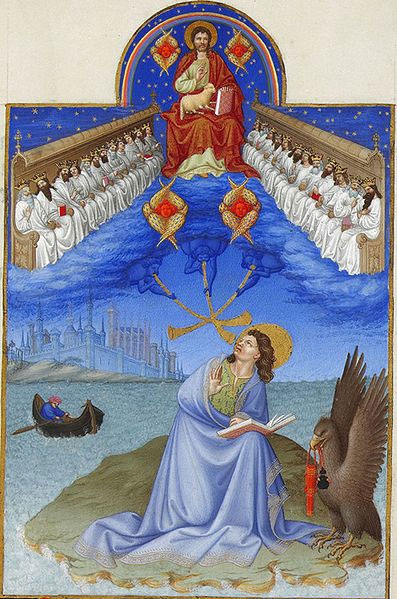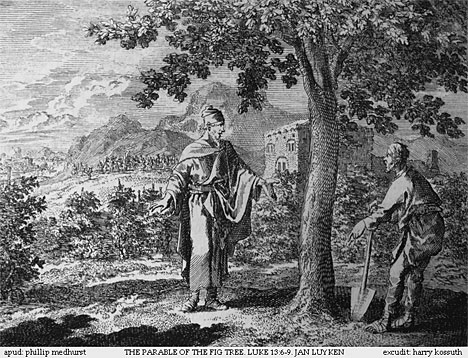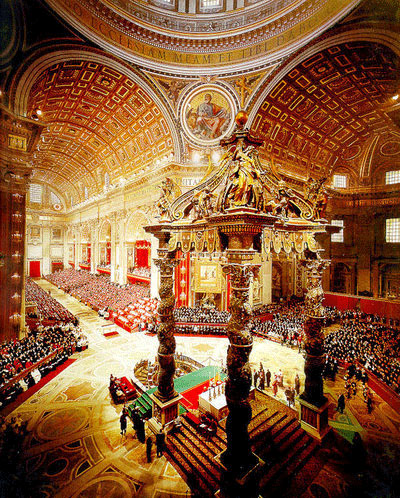Sep
29
2010

“What was from the beginning, what we have heard, what we have seen with our eyes, what we have gazed upon and our hands handled concerning the word of life—and the life was manifested, and we have seen and bear witness and announce to you the life, the eternal one, which was toward the Father and was manifested to us—what we have seen and heard, we announce also to you…”
IF I BELIEVE that the first resurrection occurred around AD70 [1], and that the New Covenant administration consists of saints living and reigning with Christ in heaven [2], these “joint-heirs” become co-mediators in some fashion. Does this open the door to the Roman Catholic practice of praying to glorified saints, or to the Eastern Orthodox love for beautiful icons?
Continue reading
8 comments | tags: AD70, Holy Place, John, Millennium, Peter Leithart, Revelation 20, Roman Catholicism | posted in Against Hyperpreterism, Biblical Theology, Quotes, The Last Days
Aug
9
2010
An Exhortation to Be A Fruitful Tree

Tabernacles was the final annual feast, a Godfest to be thrown by Jews as a ministry to Gentiles. At the Feast of Clouds [1], every household temporarily became a new house of God, a “local branch” of the Tabernacle, a “priesthood of all believers.” Of course, we see this fulfilled in the book of Acts. Just as we see Paul exhort the Ephesians (Gentiles!) to put on the mediatorial body-armour of the High Priest, [2] his final exhortation to the Roman Christians alludes to not only Israel’s feasts but Israel’s priesthood. Pretty much every church he established was a “booth” made of natural Jewish branches and ingrafted Gentile branches. [3] At Pentecost, the same cloud that received Jesus filled the house. [4] Now every household of faith was a Tabernacle, a glorious cloud with a government of human angel-elders. [5] In the Bible’s literary structure, a recurring motif at Tabernacles is good fruit, godly offspring. God wants more than just a covering of leaves. As in Eden, future generations hang upon wise government.
Continue reading
8 comments | tags: AD70, Add new tag, Atonement, Doug Wilson, Feasts, Genesis, Laver, Literary Structure, Paul, Roman Catholicism, Romans, Systematic typology, Tabernacles, Temple | posted in Bible Matrix, Biblical Theology, The Last Days
Jun
21
2010

or Why Idolatry is Adultery
“So [Abraham] lifted his eyes and looked, and behold, three men were standing by him; and when he saw them, he ran from the tent door to meet them, and bowed himself to the ground…” Genesis 18:2
“Then Abraham stood up and bowed himself to the people of the land, the sons of Heth.” Genesis 23:7
I’ve finally gotten around to doing the post that was to follow Stuff Is Good.
In his little torpedo of a book, The Liturgy Trap, James Jordan gives a definition of idolatry that is worth the price of the book. Firstly, it is natural that the de-eschatologised churches, (the ones that think they need no death-and-resurrections) contain icons. A church that has already arrived [1] must be able to present the unseen as already-seen:
Continue reading
Comments Off | tags: Genesis, James Jordan, Roman Catholicism, Worship | posted in Biblical Theology, Christian Life
Jun
4
2010

Reformation: Redefinition or Glorification?
Pastor David P. Cassidy discussed the redefinition of the “unchangeable Roman church” by Cardinal Newman, a component integral to the possibility of the revolutionary Vatican II, before taking listeners on a tour of the changes that swept through the institution in the twentieth century. Here is the conclusion of the lecture:
…Vatican II represents the most significant shift, not simply within the Roman Catholic Church and in our relationship with it, but in the whole history of church councils. Words such as charism, conscience, the priesthood of all believers, brothers and sisters, collegiality, and so on, dominate the discussions in the documents of the councils. Scholastic theological terminology is eschewed largely in favour of biblical vocabulary. Absent, gone, are words of intimidation and threat, and alienation and exclusion. Vatican II issued not a single doctrinal definition, though that is what councils had always done. Not a single anathema, not a single canon. Power words are gone, replaced by persuasion. Style, of course, has a lot to do with the difference in meaning, as the difference between prose and poetry makes clear. By its choice of language, Vatican II sought to present the Roman Catholic Church as one which retained an interior hierarchical reality, but with a new exterior, serving, personality.
So, what do we learn at the end of this tour?
Continue reading
Comments Off | tags: Church Fathers, Church History, David Cassidy, Liberal theology, Postmillennialism, Roman Catholicism | posted in Quotes
Apr
10
2010
or The Church with the Big Head

Human talent amazes me. Totally aside from the child prodigies, we are an extremely gifted bunch. After only a couple of decades on the planet, from those who have the opportunity to apply themselves with enthusiasm to their particular area of interest, we see some incredible achievements. For the godless, this should certainly seem miraculous. But for our dark hearts it just proves how smart and wonderful we already are in ourselves. This is the ingratitude Paul speaks of.
For Christians, talent (or beauty or wealth) is just another dead giveaway of God’s existence. And God Himself almost seems to despise this early glory as a short-lived covering of wildflowers that appears suddenly after some long-awaited rain. This is the glory of youth and it is insufferably vain. It exalts itself by calling its competition dumb and ugly.
Continue reading
Comments Off | tags: Barth, Jeff Meyers, Obama, Postmillennialism, Reformation, Roman Catholicism | posted in Biblical Theology, Christian Life, Creation, Quotes
Feb
27
2010

Some great quotes from an interview by Barbara Demarco-Barrett with author Mary Karr:
“[My young son] came flouncing in in his Power Ranger pyjamas and said “I wanna go to church.” I said “Why?” and he said, “To see if God’s there.” It was about the only sentence he could have said that would have gotten me to go. So we did this thing we called God-a-rama in which we went to various temples and mosques and zendos. I had no interest in going to church so I brought a latté and a paperback.
Continue reading
4 comments | tags: Conversion, Faith, Poetry, Prayer, Roman Catholicism | posted in Christian Life, Quotes
Jan
18
2010

WORDS OF WARNING:
[Romans] is not a letter written to generic Gentiles. These words are given to the saints in Rome. “To all that be in Rome, beloved of God, called to be saints” (Rom. 1:7). When he cautions them against hubris, why would he do this? He did it because he saw the first stirrings of it. Remember that Paul characteristically argues “one of you will say then,” and he does this because he knows how the Q&A sessions usually go. And what happens here? “God cut out the Jews to make way for us Romans” (v. 19). Remember that this was the capital city of the most powerful empire in the world. Anyone who thinks that Christians don’t get caught up by this kind of reflected glory need to ask more pointed questions of their sinful hearts. The Lord spurned the devil’s offer of all the kingdoms of men in their glory—His followers have not always been so successful.
Continue reading
Comments Off | tags: Doug Wilson, Paul, Roman Catholicism, Romans | posted in Biblical Theology, Quotes
Dec
2
2009

And they came to Him and awoke Him, saying, “Master, Master, we are perishing!” Then He arose and rebuked the wind and the raging of the water. And they ceased, and there was a calm. But He said to them, “Where is your faith?” And they were afraid, and marveled, saying to one another, “Who can this be? For He commands even the winds and water, and they obey Him!” (Luke 8:24-25)
You know those times when all life’s troubles and hurdles and temptations seem overwhelming? (Yes, I know I live in the luckiest country in the world.) I think the devil takes great pleasure in piling stuff like that into your mind and watching you panic. Last night, I woke up and this old process began. Like water poured onto sand, it just makes the old furrows (one’s bad thought-habits) grow even deeper.
Continue reading
1 comment | tags: Faith, Luke, Roman Catholicism | posted in Christian Life
Nov
30
2009
 .
.
Victor left some comments on Mother of Invention which I think deserve a new post:
Hello Mike!
I’m a student of typology – endlessly fascinating endeavor! – and am not and never have been Catholic myself. I would like to comment on your point about the Ark of the Covenant. (I just noticed that MS Word wants to capitalize “ark of the covenant”!)
I understand that you recognize the many parallels between the “Visitation” account in Luke 1 and the Ark’s journey narrated in 2 Samuel 6. The cumulative effect of the many commonalities between them makes the typological connection impossible to be denied. I can’t help but recognize its validity.
OTOH, I understand that you’re trying to say that in the specific context of Luke 1 the Ark should be interpreted as an image of Christ, not of Mary.
I can see a link between the person of Christ and the Ark, but, in the precise context of Luke 1, it seems inescapable to me that the comparison is made between the Ark and the person of Mary the mother of Jesus. That’s the whole gist of the correlation between the stories of 2 Samuel and Luke.
Continue reading
2 comments | tags: Ark of the Covenant, Leviticus, Luke, Mary, Roman Catholicism, Tabernacle | posted in Biblical Theology
Nov
28
2009

or Drive-By Typology
——————————————————————————-
Rome has this whole nutty Oedipus thing going. They want the infantile security of Mary’s breast when God calls them to grow up, to be as individuals men worthy of a bride’s affections, and corporately a bride who adores only her Husband!
——————————————————————————-
Verifying typological connections is a tricky business. Like driving, it is not a skill but an art. This means that although there are certain rules to follow, above all of that there are situations where being steeped in the types and structures of the Bible is the only way to proceed with wisdom. James Jordan recently commented that any such exegesis should be carried out within the conversation of the church, and:
“The popular notion that everyone should be able to read and exegete the Bible equally, as a result of learning some so-called “science” of hermeneutics, is about as stupid as thinking everyone can write music like Bach and Beethoven by studying the rules of harmony and counterpoint; or that anyone can be a Shakespeare.”
I’m no Shakespeare, but James Jordan’s identification of the biblical “universals” and an explanation of biblical types has helped me enormously. The Bible matrix structure has also helped me enormously. They are typological “systematics.” It is this kind of grounding, like practising scales on a piano, that enables us to more easily identify abuses of typology — such as the claim that Mary is a “New Eve.” Dischordant notes can be used to great effect in great music, but it takes a practised musician to know when it is within a greater “harmony” and when it is not. This is beyond the basic scales.
Continue reading
5 comments | tags: Athaliah, Baptism, Bible Matrix, Hermeneutics, James Jordan, Mary, Peter Leithart, Roman Catholicism, Systematic typology, Totus Christus | posted in Biblical Theology



































